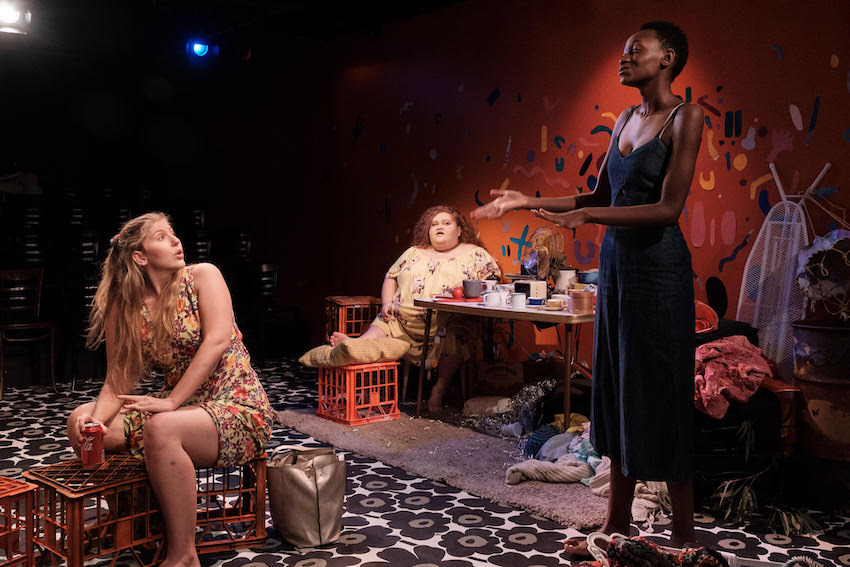It’s around 4pm on a Friday afternoon, and Moreblessing Maturure has just finished rehearsing for a new play, A Little Piece of Ash. We meet up on Oxford Street, in inner-city Sydney, and wander around, looking for a place to sit and chat.
It’s that awkward time of day when the cafés are closing and it’s still too early to visit a bar. We visit one anyway.
Actor, writer, activist, model, public speaker — Maturure calls herself a “slashie enthusiast”. She’s always looking for a new career direction to add to her bulging portfolio.
At 23, she has already launched FOLK Magazine, which showcases artists of colour, been featured in a Vogue issue on the next generation of agenda-setting thinkers and creatives, and worked as a resident writer for the Sydney Theatre Company.
In April, she gave a TEDxYouth Talk at Sydney’s Seymour Centre on the power of storytelling. Last year, she won an African Australian Award for excellence as an interdisciplinary artist.
The eldest of four children, Maturure was born in Zimbabwe and moved to Australia with her family when she was eight. Initially they settled in Chatswood, on Sydney’s North Shore.
“I was raised in Australia, but the household I was raised in wasn’t necessarily Australian,” she recalls, with a smile.
“It took us a year or so to find somewhere to buy ingredients for our traditional dishes.”

The shops were better stocked in the north-western Hills District, where the family eventually moved to. They were able to make maize meal, a staple Zimbabwean dish which Maturure still eats three to five times a week.
Initially they were the only black family in their neighbourhood. She and her sister, Taylitha, were the only black students at Cherrybrook High School.
Taylitha remembers her sister as an “extrovert” back then.
“She was always the most popular student in high school — SRC [Student Representative Council], that kind of thing.”
From early on, Maturure was drawn to arts-related subjects. Christianity featured prominently in her childhood. At 17, her goals were: “Finish high school, go to Bible college, then go to drama school and become a pastor or actor.”
She also considered a professional tennis career. “I always had a racket in hand … [I thought], ‘If Serena [Williams] can do it why can’t I?'”
As she moved up the ranks, though, she had to commit to training three to four days a week. It was too much, and she really felt acting was her passion.
With her towering stature (5ft 11in), high cheekbones and big, brown eyes, it’s not surprising Maturure has been in demand as a model. She looms over me (I am 5ft 7in) in her high-top Converses.
She is also a ball of energy, and highly entertaining company, punctuating her anecdotes with dramatic gestures and adopting different accents for each character involved.
Much of Maturure’s work focuses on race, gender and sexuality. She identifies as a “queer black woman”. Her family complain that her work is “too angry” — but she explains, with a flash of her eyes and a roll of her hands, that she is driven by the desire to make an impact on society.
Which artistic achievement is she most proud of? She lets out a long “hmm” and taps her chin, deep in thought.
“An immersive, interactive play called Like Me,” she replies eventually. “I wrote and performed in it.”
The play — about social media, and the constant craving for private and public attention which it can trigger — was put on by production company Mongrel Mouth in an abandoned FedEx warehouse.
Duncan Maurice, the co-founder of Mongrel Mouth, who directed Like Me, describes Matuture as “an intensely driven, intelligent, enlightened young woman”. He adds:

“I really like working with her because, like any good creative colleague, she inspires and challenges me.”
Maurice also praises Matuture’s “global perspective” and her understanding of where the Sydney arts scene sits within that wider picture.
He first met her five years ago, when she auditioned for another Mongrel Mouth production, and was struck by her humility and confidence.
As a “queer white man”, Maurice says the pair “have a camaraderie around inequality and what that means”.
Maturure has distanced herself from the Christianity of her upbringing.
“On Mother’s Day, my sister said I should attend church with her as a gift … and I was like, ‘I’ll get her a book!’”
She can be uncompromising, she admits, when discussing politics with her family. “If they are only two degrees off, I see them as wrong.”
She is close to her sister, though, sharing clothes with her just as they used to share a room.
“As someone who’s not part of the ‘artsverse’, I’m able to give her (Maturure) a complementary perspective on certain issues,” says Taylitha.
Maturure swings between what she believes to be the best methods to achieve social change.
“Depending on what day you ask me, I’ll be like, ‘No, we can do it tomorrow, just fuck y’all, just burn it down and start again.
‘This is all trash, get rid of it, let’s start again.’
“But then the other part of me is like, ‘Change is gradual, sustainable change is gradual. You can’t change things in one day and expect it to last forever, you’ve gotta do that step by step, and it’s going to take time.’”
As Africa, by Toto, plays softly in the background, I ask Maturure what is most important to her in life.
After a long pause, she replies: “I feel like my answer should be family … but that’s not my answer.
“Growth as an individual is most important to me. I never want to be comfortable. It’s important for me to always be building on what I’ve just done.” – @iliasbakalla


